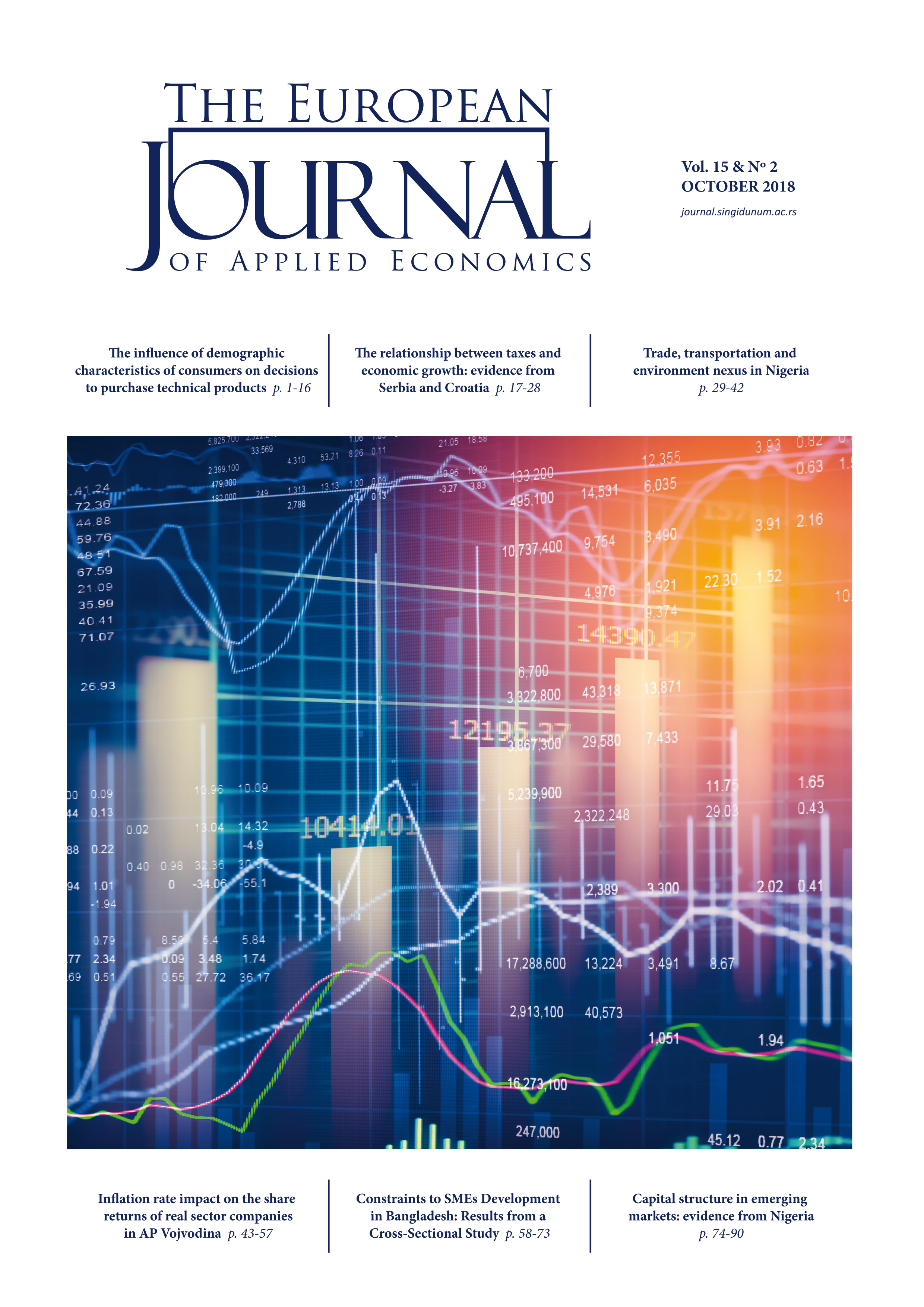Trade, transportation and environment nexus in Nigeria
Sažetak
This study investigates trade, transportation and environment nexus
in Nigeria. The main objective of the study is to incorporate transportation
activities and trade into the EKC model seeing transportation
as an important factor that determines environmental degradation in
Nigeria. Annual data from 1984 to 2014 is used in the study, whereas
ARDL estimation technique was adopted to analyse the data. The results
show that all the variables have a positive significant correlation
with carbon emissions in Nigeria except trade that was negative and
insignificant. According to ARDL estimates,trade, import transport
services and GDP per capita have positive impact on CO2 emissions in
the long-run while in the short-run, the result shows that trade, GDP
per capita, energy consumption and transport services are capable of
correcting about 74% deviation of carbon emissions back to long-run
equilibrium. Based on the findings, drawn conclusion stipulates that
energy consumption and trade are the main determinant factors that
contribute to carbon emission and appropriate attention should be
given to energy consumption by considering alternative efficient energy
sources to curb the increasing emission in Nigeria.
Reference
Achike, A. I., Onoja, A. O., & Agu, C. (2012). Green house gas emission determinants in Nigeria: implications for trade, climate change mitigation and adaptation policies. Retrieved from http://www.trapca.org/working-papers/revised-version-of-paper-by-achike-onoja-and-Agu.pdf
Ahmad, N., & Wyckoff, A. (2013). Carbon dioxide emissions embodied in international trade of goods. OECD Science, Technology and Industry Working Papers, 2003/15 1-66.
Ali, Z., Zaman, Z., & Ali, M. (2015). The Effect of International Trade on Carbon Emissions: Evidence from Pakistan. Journal of Economics and Sustainable Development, 6(9), 289-299.http://www.iiste.org/Journals/index.php/JEDS/article/viewFile/22639/23309
Athula, N. (2011). Does Trade Openness Promote Carbon Emissions? Empirical Evidence from Sri Lanka. The Empirical Economics Letters, 10(10), 972-986. Retrieved from http://hdl.handle.net/10072/42748
Avetisyan, M., Cristea, A., Hummels, D., & Puzzello, L. (2010). Trade and the Greenhouse Gas Emissions from International Freight Transport. Retrieved from http://citeseerx.ist.psu.edu/viewdoc/download?doi=10.1.1.364
.3822&rep=rep1&type=pdf
Cristea, A., Hummels, D., Puzzello, L., & Avetisyan, M. (2013). Trade and the greenhouse gas emissions from international freight transport. Journal of Environmental Economics and Management, 65, 153-173. DOI:10.1016/j.jeem.2012.06.002
Feng, Z., Xue, J., & Song, Y. (2013). Research on carbon emissions in China’s export trade based on input-output model. Chinese Journal of Population Resources and Environment, 11(1), 1-9. DOI:10.1080/10042857.2013.
Fenger, J. (2009). Air pollution in the last 50 years – From local to global. Atmospheric Environment, 43, 13-22. DOI:10.1016/j.atmosenv.2008.09.061
Fernandez-Amador, O., Francois, J. F., & Tomberger, P. (2016). Carbon dioxide emissions and international trade at the turn of the millennium. Retrieved from https://www.wto.org/english/res_e/reser_e/gtdw_e/wkshop16_e/francois_e.pdf
Gozgor, G., & Can, M. (2016). Does export product quality matter for CO2 emissions? Environmental Science Pollution Resources, 1-10. DOI 10.1007/s11356-016-8070-6
Hasson, A., & Masih, M. (2017). Energy consumption, trade openness, economic growth, carbon dioxide emissions and electricity consumption: evidence from South Africa based on ARDL. Retrieved from https://mpra.ub.uni-muenchen.de/id/eprint/79424
Islam, M. R., Cheng, Y., & Rajib, M. S. (2012). International Trade and Carbon Emissions (CO2): The case of Bangladesh. Journal of Economics and Sustainable Development, 3(5), 18-27.http://citeseerx.ist.psu.edu
/viewdoc/download?doi=10.1.1.855.7442&rep=rep1&type=pdf
Keho, Y. (2016). Trade Openness and the Environment: A Time Series Study of ECOWAS Countries. Journal of Economics and Development Studies, 4(4), 61-69. DOI:10.15640/jeds.v4n4a6
Kim, N. S., Janic, M., & Wee, B. v. (2010). Trade-Off Between Carbon Dioxide Emissions and Logistics Costs Based on Multiobjective Optimization. Transportation Research Record, 107-116. DOI: 10.3141/2139-13
Kozul-Wright, R., & Fortunato, P. (2012). International Trade and Carbon Emissions. European Journal of Development Research, 24(4), 509-529.
Li, J., Lu, Q., & Fu, P. (2015). Carbon Footprint Management of Road Freight Transport under the Carbon Emission Trading Mechanism. Mathematical Problems in Engineering, 1-14.
Monkelbaan, J. (2011). Transport, Trade and Climate Change: Carbon Footprints, Fuel Subsidies and Market-based Measures. International Centre for Trade and Sustainable Development, 1-60.
Peters, G. P., Marland, G., Hertwich, E. G., Saikku, L., Rautiainen, A., & Kauppi, P. E. (2009). Trade, transport, and sinks extend the carbon dioxide responsibility of countries: An editorial essay. Climatic Change, 97, 379-388. DOI:10.1007/s10584-009-9606-2
Shapiro, J. S. (2016). Trade Costs, CO2, and the Environment. Retrieved from http://www.econ.yale.edu/~js2755/Trade_CO2_Environment.pdf. 1-64.
Takarada, Y., Ogawa, T., & Dong, W. (2014). Trade, Transportation, and the Environment: Welfare Effects of Emissions Reductions and International Emissions Trading. Retrieved from http://www.etsg.org/ETSG2014/Papers/188.pdf
Weber, C. L., Matthews, S. H., Corbett, J. J., & Williams, E. D. (2007). Carbon Emissions Embodied in Importation, Transport and Retail of Electronics in the U.S. A Growing Global Issue. in: Proceedings of the 2007 IEEE Symposium on Electronics and the Environment, 174-179.
Zhang, S., Liu, X., & Bae, J. (2017). Does trade openness affect CO2 emissions: evidence from ten newly industrialized countries? Environmental Science Pollution Resources. DOI:10.1007/s11356-017-9392-8


